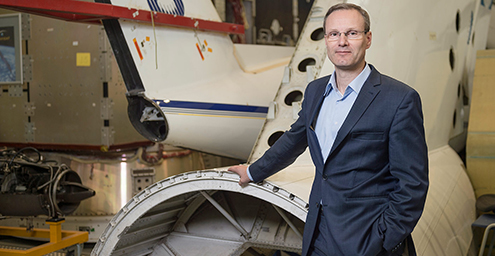Aerospace expert Joris Melkert from TU Delft is one of the first four Education Fellows at TU Delft. The Delft Education Fellowships are awarded annually to lecturers who have made a substantial and valuable contribution to teaching at TU Delft. As part of the Fellowship, Melkert is going to involve students in building a real aircraft. Melkert explained, ‘Most of the problems facing the aerospace industry today concern the production side, so this is what we are going to focus on.’
The elective module that Melkert is developing fits into the faculty's ‘Pioneering Innovations’ project called ‘Building Aircraft’ and will be taught within the Master’s track Flight Performance and Propulsion and the ASM track. Melkert continued, ‘There's quite a gap between all the fantastic ideas thought up at this university and their actual implementation. As things stand at the moment, the aerospace industry focuses more on production than on design. I think lecturers should take this into account, so that our students are fully prepared when they graduate. They should hit the ground running.’
For the duration of the new module, Melkert is devising, the mezzanine in the Aeroplane Hall will be rearranged to simulate an aircraft factory. The Faculty is purchasing a construction pack for a VAN RV12. But this isn't just a game – a real aircraft will be built that can actually fly, and could be sold to a private party once it is finished. Melkert added, ‘It's a unique experience whereby students will feel what it's like to work in the strictly controlled environment of an aircraft factory. They will have to comply with airworthiness requirements, quality controls and the dynamics of working with colleagues with differing interests, while also trying to be highly innovative. In addition, they will eventually have to pass ‘their’ project on to another group.’
A challenging project
The aim is to teach the module three times a year. It will last for 20 weeks and generate 6 ECTS. It is expected to start in February, providing places for around 15-20 students per round. Melkert clarified, ‘Students will be selected on the basis of a motivation video, their marks and an interview. We will also pay attention to the composition of the team: diversity is very important.’ Working as members of the team, students will not only develop good technical skills, but also gain a better understanding of the safety culture involved in producing and certifying an aircraft. In addition, they will be confronted with organisational issues, such as project and certification administration and ensuring that the project passes smoothly to the next team. Melkert concluded, ‘In short, it's a project to get your teeth into.’
As yet, no companies are involved in developing the module. ‘But,’ says Melkert, ‘that would be beneficial to both parties. We are at the beginning of a highly ambitious project and would welcome any ideas, questions and support. An initial investigation revealed that there is already a great deal of interest.’
Photo by Marcel Krijger
